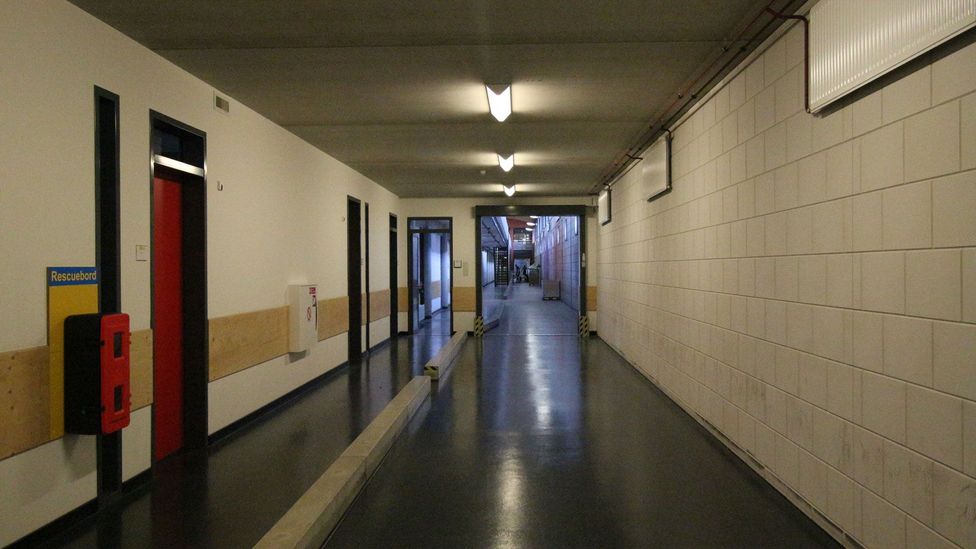Going to Jail Again After15 Years
How prison house changes people

Longer and harsher prison sentences tin can mean that prisoners' personalities will be changed in means that brand their reintegration difficult, finds Christian Jarrett.
Day after solar day, yr after year, imagine having no space to call your ain, no option over who to be with, what to eat, or where to become. There is threat and suspicion everywhere. Love or even a gentle human bear on can exist difficult to find. You are separated from family unit and friends.
If they are to cope, then prisoners confined to this kind of environment have no option just to change and conform. This is specially true for those facing long-term sentences – in England and Wales, effectually 43% of sentences at present last more than four years.
In a report on the psychological bear upon of imprisonment for the United states of america government, the social psychologist Craig Haney (who collaborated with Philip Zimbardo on the infamous Stanford Prison Experiment) was frank: "few people are completely unchanged or unscathed by the [prison] feel".
You might also like:
• The prison house problem that'south often ignored
• Why the Dutch treat criminal offense differently
• When personality goes from bad to proficient
Based on their interviews with hundreds of prisoners, researchers at the Establish of Criminology at the Academy of Cambridge went further, stating that long-term imprisonment "changes people to the core". Or in the stark words of a long-term inmate interviewed for research published in the 1980s, later on years in prison "you ain't the same".

Reintegration into society can be difficult after a long prison house sentence (Credit: Getty Images)
In the field of personality psychology, it used to exist believed that our personalities remain largely fixed in adulthood. Simply recent enquiry has constitute that, in fact, despite relative stability our habits of thought, behaviour and emotion exercise modify in significant and consequential ways – peculiarly in response to the unlike roles that we adopt as we go through life. It is almost inevitable and so that time spent as a prisoner, in a highly structured yet socially threatening surroundings, is bound to lead to significant personality changes.
Specially for anyone concerned nigh prisoner welfare and how to rehabilitate former convicts, the worry is that these personality changes, while they may help the prisoner survive their jail time, are counter-productive for their lives upon release.
Key features of the prison environment that are likely to pb to personality change include the chronic loss of gratuitous choice, lack of privacy, daily stigma, frequent fearfulness, need to clothing a constant mask of invulnerability and emotional flatness (to avoid exploitation by others), and the requirement, day subsequently day, to follow externally imposed stringent rules and routines.
'Prisonisation'
There is surprisingly little research on how these chronic features of the environs might alter prisoners' personalities in terms of the "Big Five" model of personality that dominates almost modernistic enquiry on the general, non-prison population (based around the fundamental traits like extroversion and conscientiousness).

Prisoners adapt to their surround after long stints of jail time (Credit: Getty Images)
All the same, there is widespread recognition among psychologists and criminologists that prisoners adjust to their environment, which they telephone call "prisonisation". This contributes towards a kind of "post-incarceration syndrome" when they are released.
Consider the findings from 'in-depth interviews with 25 former 'lifers' (including 2 women) in Boston, who had served an average of nineteen years in jail. Analysing their narratives, psychologist Marieke Liema and criminologist Maarten Kunst establish that the former prisoners had adult "institutionalised personality traits", including "distrusting others, difficulty engaging in relationships [and] hampered controlling".
1 42-year-old male former prisoner said: "I do [nonetheless] kind of human action like I'1000 nevertheless in prison, and I mean you [are] non a light switch or a h2o faucet. You can't just turn something off. When you've washed something for a certain corporeality of time… it becomes a part of yous."
The personality modify that most dominated their accounts was an inability to trust others – a kind of perpetual paranoia. "You cannot trust anybody in the articulation," said some other of the interviewees, a man now aged 52. "I do have an upshot with trust, I merely exercise not trust anybody."
Interviews with hundreds of United kingdom prisoners undertaken by Susie Hulley and her colleagues at the Institute of Criminology painted a similar movie. "Many… told us that they had undergone significant and sometimes wholesale personal transformations," the researchers wrote in 2015.

Prison house can 'become part of y'all', ane inmate said (Credit: Getty Images)
The prisoners described a process of "emotional numbing". "It does harden you. It does make y'all a bit more than distant," one said, explaining how people in jail deliberately muffle and suppress their emotions. "Information technology is who you get, and if you are hardened in the beginning then you lot become even harder, y'all become fifty-fifty colder, you lot go more detached." Another prisoner stated: "It'due south... I, kind of, don't accept feelings for people" whatsoever more than.
In terms of the Big Five personality traits, one could characterise this as a course of farthermost depression neuroticism (or high emotional stability or flatness), combined with low extraversion and low agreeability – in other words, non an platonic personality shift for the return to the outside world.
That is certainly the business organisation of Hulley and her colleagues. "Equally the long-term prisoner becomes 'adapted' – in the true sense of the term – to the imperatives of a sustained period of confinement, he or she becomes more than emotionally detached, more self-isolating, more socially withdrawn, and perchance less well suited to life later release," they warned.
The interview-based studies so far involved long-term prisoners incarcerated for many years. But an exploratory paper published in Feb 2018 used neuropsychological tests to show that even a short stay in prison had an bear on on personality.
Criminal Myths
A special serial about the factors that shape crime
The researchers led by Jesse Meijers at Vrije Universiteit Amsterdam tested 37 prisoners twice, three months autonomously. At the second test, they showed increased impulsivity and poorer attentional control. These kinds of cognitive changes could indicate that their conscientiousness – a trait associated with self-discipline, orderliness and ambition – has deteriorated.

Prison fourth dimension tin can result in increased impulsiveness and poorer attentional control (Credit: Alamy)
The researchers think the changes they observed are likely due to the impoverished environment of the prison house, including the lack of cognitive challenges and lost autonomy. "This is a significant and societally relevant finding," they concluded, "every bit released prisoners may exist less capable of living a lawful life than they were prior to their imprisonment".
All the same, other findings offer some glimmers of hope. For another recent paper – one of the few to use the Big V model to prisoner personality change – researchers compared the personality profiles of maximum security prisoners in Sweden with diverse control groups, including college students and prison guards. They found that while the prisoners scored lower on extroversion, openness, and agreeableness, as y'all might expect, they actually scored college on conscientiousness, especially the 'sub-traits' of orderliness and cocky-discipline.
The researchers, led by Kristianstad University'due south Johanna Masche-No, don't believe this was due to a social desirability event – that the prisoners were trying to make a good impression on the squad asking them questions – because the results were confidential and the prisoners described themselves in unflattering terms on other traits like agreeability.
Instead, the researchers remember their findings may reflect a form of positive personality adjustment to the prison situation: "The environs in a prison house is very strict with respect to both regulations and norms, and private space is express," they concluded. "Such an environment places demands on inmates to learn lodge to avoid both formal punishment and negative acts from co-inmates."
In other words, it can help to exist conscientious to stay out of trouble.

Ane grouping of Dutch prisoners showed improvements in their spatial planning abilities (Credit: Melissa Hogenboom)
Although these findings from Sweden seem to contradict the Dutch inquiry, it's worth noting that while the Dutch prisoners became more impulsive and less attentive, they likewise showed improvements in their spatial planning abilities, which could be seen as related to orderliness (Meijers and his colleagues did not read too much into this improvement because they said information technology could merely accept been that the prisoners scored higher on the test the second time round considering they'd had more practice at it). Some other possibility is that the high conscientiousness seen in the Swedish prisoners is specific to their country's prison house organization, where there is a greater accent on treatment and rehabilitation than in many other countries.
Also hopeful, and somewhat in line with the Swedish findings, 2 recent studies involved prisoners playing financial games that are often used to study cooperation, run a risk-taking and penalisation (one of the games is unrelatedly called The Prisoner's Dilemma). These showed that prisoners engaged in normal or even heightened levels of cooperation.
The findings have implications for debates nigh the reintegration of criminals into guild, says
Sigbjørn Birkeland at the NHH Norwegian School of Economics, who conducted one of these studies with colleagues. "A mutual perception… is that criminals are bad guys who lack prosocial motivation and this perception may potentially exist used to justify harsh sentencing of criminals," they wrote. Their results evidence, they said, that criminals tin can exist just every bit "equally pro-socially motivated as the full general population."
As awareness grows that personality is malleable, hopefully this will lead to greater efforts to consider how the prison environment tin shape an inmate's grapheme. This conspicuously could affect their return to society.

Testify suggests that the longer and harsher the prison sentence – the more likely that prisoners' personalities will be changed (Credit: Alamy)
In that location is currently a dearth of existing research with this explicit aim. For now, the evidence we take suggests that prison house life leads to personality changes that are likely to hamper a person's rehabilitation and reintegration. To 1 extent that may exist inevitable, given the loss of privacy and freedom.
But that said, the research findings regarding prisoner conscientiousness and cooperation prove all hope is not lost, and they highlight potential targets for rehabilitation programmes.
These are non just abstruse issues of concern to scholars: they have profound implications for how nosotros as a guild wish to deal with those who break our laws. The current evidence suggests that the longer and harsher the prison sentence – in terms of less liberty, choice and opportunity for safe, meaningful relationships – the more likely that prisoners' personalities will be changed in means that make their reintegration hard and that increase their risk for re-offending.
Ultimately, society may be confronted with a pick. We can punish offenders more severely and risk changing them for the worse, or we can design sentencing rules and prisons in a way that helps offenders rehabilitate and modify for the better.
--
Dr Christian Jarrett edits the British Psychological Society's Inquiry Digest blog. His adjacent book, Personology, volition exist published in 2019.
Join 800,000+ Future fans by liking united states of america on Facebook , or follow us on Twitter .
If you liked this story, sign up for the weekly bbc.com features newsletter , chosen "If Yous Simply Read vi Things This Calendar week". A handpicked selection of stories from BBC Futurity, Culture, Capital, and Travel, delivered to your inbox every Friday.
hulme-moirnessichaved.blogspot.com
Source: https://www.bbc.com/future/article/20180430-the-unexpected-ways-prison-time-changes-people
0 Response to "Going to Jail Again After15 Years"
Post a Comment